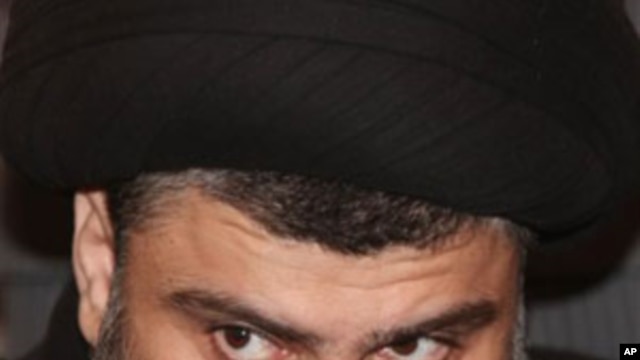Iraqi Cleric Muqtada Sadr Leaves for Iran Again
Shi’te cleric Muqtada al-Sadr attends Friday prayers in Kufa, 160 kilometers (100 miles) south of Baghdad, Iraq, 14 Jan 2011
January 21, 2011
After his triumphant return to Iraq on January 5, an aide to
firebrand anti-U.S. cleric Moqtada al-Sadr says Sadr has gone back to
Iran, where he has spent more than three and a half years studying in
the Shi’ite theological center of Qom. Analysts are debating the
implications of Sadr’s latest move.Shi’ite cleric Moqtada al-Sadr has surprised many observers by going back to Iran just over two weeks after his much-commented-upon return to Iraq.
During his brief comeback, Sadr told his followers in a fiery televised speech from the Shi’ite holy city of Najaf, to “resist occupiers, including the U.S. and others, by all possible means.”
The U.S. has pledged to withdraw its remaining 50,000 troops from Iraq on schedule by the end of this year. Those troops are involved in mostly support and training of Iraq’s security forces.
Al Arabiya TV, quoting several of Sadr’s close allies, says that the anti-U.S. cleric returned to Iran Thursday to resume his religious studies.
Analyst Houchang Hassanyari, who teaches political science at Canada’s Royal Military College, says that some of Sadr’s allies are claiming that he is returning to Iran due to “alleged threats by the U.S.” and others.
Nevertheless, Hassanyari believes that Sadr is merely returning to complete his theological training in Shi’ite jurisprudence, or “fiqh”, with top Iranian scholars.
“The official position or explanation for his return to Iran is that he is threatened by Americans and their allies in Iraq to be assassinated,” he said. “That’s the official reason. I think what might provoke his return to Iran is the fact that now the government is in place, his colleagues are participating in the government, the Americans are on the verge of leaving Iraq as planned by President Obama and probably everything is settled down and he goes back to continue his education.”
Hassanyari adds that many in Iran’s clerical leadership are hoping that Sadr will eventually serve as a bridge between both country’s leaderships, possibly assuming a position similar to that of Iran’s Supreme Leader Ayatollah Ali Khamenei.
Moqtada al-Sadr comes from a family of Iraqi religious leaders, including his grandfather and his uncle, who were both top ayatollahs. The two were tortured and killed during the lengthy rule of former Iraqi leader Saddam Hussein.
Hassanyari notes that there has been talk of Sadr eventually taking the place of Iraq’s venerable Shi’ite cleric Ayatollah Ali Sistani. For that to happen, however, he stresses, Sadr must become a “marjah” or religious authority first. Being a marjah is one step beyond being an ayatollah.

No comments:
Post a Comment